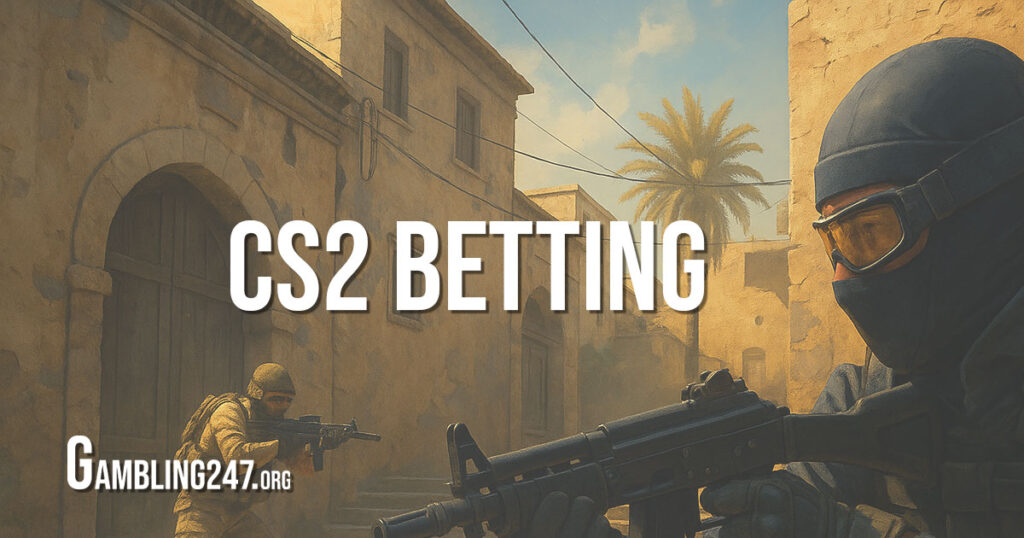CS2 betting

Counter-Strike 2 has quickly become one of the top choices in esports for betting enthusiasts around the world. With its tactical depth, high-skill ceiling, and intense competitive matches, CS2 betting offers fans countless ways to test their game knowledge.
In this article, we’ll cover everything you need to know — from the most popular CS2 betting markets and strategies to trusted CS2 betting sites and the major tournaments shaping the scene.
CS2 betting markets
The online betting opportunities for Counter-Strike 2 are rich and there are several betting markets available.
Standard Markets
- Match Winner: The simplest market—predict which team will win the match.
- Handicap Betting: Bookmakers give a map advantage (+1.5) or disadvantage (-1.5) to even the odds between favorites and underdogs.
- Over/Under Total Maps: Bet on whether the total maps played will exceed or fall short of the bookmaker’s line (typically 2.5 in a best-of-three).
- Correct Score: Predict the exact final map score (e.g., 2-0, 2-1 in a Bo3).
Specialized Markets for CS2 betting
- Map Winners: Bet on which team will win a specific map in a series.
- First Map Advantage: Wager on which team will take the opening map.
- Pistol Round Winners: Predict which team will win the crucial pistol rounds that open each half.
- Total Rounds on a Map: Bet on whether the total rounds played will go over or under a set number (often 26.5).
- Player Performance Props: Bet on individual player statistics like total kills, headshot percentage, or AWP kills.
CS2 Major Championships: Where most CS2 betting happens
The Major Championships represent the pinnacle of Counter-Strike competition and are the most heavily-bet tournaments when it comes cs2 betting.
| Tournament Series | First Year | Frequency | Notes |
|---|---|---|---|
| Majors (Valve) | 2013 | ~2/year | Most prestigious, changes organizer |
| ESL Pro League | 2015 | 2/year | Long group stages, steady circuit |
| IEM Katowice | 2014 | 1/year | Historic LAN event |
| IEM Cologne | 2014 | 1/year | Formerly ESL One Cologne |
| BLAST Premier | 2020 | 3x/year | Seasonal format + World Final |
Structure and Format of CS2 Majors
CS2 Majors are the most prestigious events in the Counter-Strike calendar, organized with the support of Valve. These tournaments generally bring together 24 of the best teams in the world, competing for a large prize pool, often exceeding $1 million.
Most Majors follow a three-stage format:
- Challengers Stage: Lower-seeded and qualifying teams face off in a Swiss-system format, battling for a spot in the next round.
- Legends Stage: The top Challengers join higher-seeded, pre-qualified teams. This stage also uses a Swiss format, where teams need to win three matches to advance.
- Champions Stage: The final eight teams compete in single-elimination playoffs, with best-of-three matches deciding who claims the Major title.
The exact format can vary slightly depending on the organizer, but the overall structure remains consistent — ensuring both rising talent and elite teams get a shot at the trophy.
CS2 Majors: What Bettors Should Know
Betting on Majors comes with its own dynamics. These high-stakes tournaments differ from regular-season events in several key ways:
- Preparation Depth: Teams often spend weeks or even months preparing for Majors, crafting strategies and practicing map control. This can lead to unexpected performance shifts.
- Pressure and Nerves: Majors bring immense pressure. Even experienced players can struggle under the spotlight, while newcomers might either crack or rise to the occasion.
- Expanded Map Pool: Teams are expected to perform across a broader selection of maps. This can expose weaknesses not seen in smaller events.
- Upset Potential in Early Rounds: The initial best-of-one matches are known for surprises, as underdogs can take advantage of the short format.
- Form Over Reputation: A well-prepared lower-ranked team in form can outperform a more established squad, especially in the early stages.
Differenet betting strategies for CS2
Research-Based Approach
Successful CS2 betting requires thorough research into:
- Team Form: Recent results and performance trends
- Map Pool Analysis: Team win rates and tendencies on specific maps
- Head-to-Head History: Previous matchups between the teams
- Roster Changes: Recent player additions or substitutions
- Travel Schedule: Fatigue and jet lag can significantly impact performance
Value Betting in CS2
Finding value bets—where the odds offer greater potential return than the actual risk—requires:
- Line Shopping: Comparing odds across multiple bookmakers
- Early Market Analysis: Identifying favorable odds before the market corrects
- Contrarian Thinking: Looking beyond popular opinion to find overlooked opportunities
- Understanding Contextual Factors: Tournament importance, team motivation, and strategic matchups
Live Betting Opportunities
CS2’s round-based structure makes it ideal for live betting:
- Economy Tracking: Understand how team economies develop and influence round outcomes
- Momentum Shifts: Identify when a team is gaining or losing momentum
- Side Specialization: Some teams excel on T-side or CT-side of specific maps
- Clutch Performance: Certain players consistently outperform in 1vX situations
Understanding CS2’s Unique Betting Landscape
Game Mechanics and Betting Implications
CS2 introduced several changes from CS that impact betting:
- Sub-tick System: More precise movement and shooting mechanics that benefit aim-focused players
- Smoke Grenades: Redesigned smokes with volumetric rendering change how teams execute strategies
- Map Updates: Subtle changes to classic maps that can advantage teams who adapt quickly
- Sound Mechanics: Enhanced audio positioning that rewards teams with superior information play
Team Tiers and Betting Value
The CS2 competitive scene typically features:
- Tier 1 Teams: Consistent contenders at major events (often overvalued in betting markets)
- Tier 2 Challengers: Teams capable of upsets against top competition (frequently offering value)
- Regional Specialists: Teams that perform better in their home regions
- Rising Stars: Emerging lineups that bookmakers may not have properly assessed
